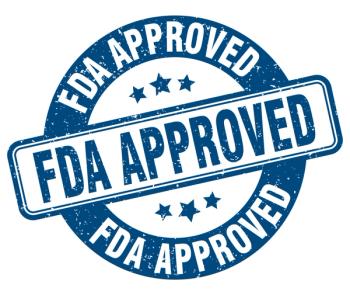
FDA Approves Short-Term Treatment for Dry Eye Disease
Loteprednol etabonate ophthalmic suspension (Eysuvis; Kala Pharmaceuticals) 0.25% is the first ocular corticosteroid indicated for dry eye disease.
The FDA has approved loteprednol etabonate (LE) ophthalmic suspension (Eysuvis; Kala Pharmaceuticals) 0.25% for short-term (up to 2 weeks) treatment of dry eye disease, according to a press release.
Dry eye disease is a chronic, episodic, multifactorial disease affecting the tears and ocular surface, and can involve tear film instability, inflammation, discomfort, visual disturbance, and ocular surface damage. LE ophthalmic suspension is the first ocular corticosteroid indicated for dry eye disease.
Kala applies its Ampplify mucus-penetrating particle (MPP) Drug Delivery Technology to LE to enhance penetration into the target tissue on the ocular surface. LE targets the immune responses that drive acute dry eye disease flares.
The FDA approval is based on results from 4 clinical trials, including 3 phase 3 trials and 1 phase 2 trial. In all of the phase 3 trials, statistical significance was achieved after 2 weeks of dosing for the sign end point of conjunctival hyperemia, according to the findings.
Additionally, in 2 of the phase 3 trials, significance was observed for the symptom end points of ocular discomfort severity in both the overall intent-to-treat (ITT) populations and in a predefined subgroup of ITT patients with more severe ocular discomfort at baseline.
LE ophthalmic suspension was well-tolerated across all trials, with adverse events and intraocular pressure increases comparable to that observed with vehicle.
“The approval of Eysuvis ushers in a new era in the treatment of dry eye disease and offers promise to the millions of dry eye patients who experience acute exacerbations, or flares, or their disease each year,” Edward Holland, MD, director of Cornea Services at Cincinnati Eye Institute and professor of ophthalmology at the University of Cincinnati, said in a statement. “For the first time we will be able to offer dry eye patients a therapeutic option that provides rapid relief for both the signs and symptoms of the disease and that is safe and well tolerated.”
Kala plans to launch LE ophthalmic suspension by the end of the year.
Reference:
- Kala Pharmaceuticals Announces FDA Approval of Eysuvis for the Short-Term Treatment of the Signs and Symptoms of Dry Eye Disease. News release. Kala Pharmaceuticals; October 27, 2020. Accessed October 28, 2020.
https://investors.kalarx.com/news-releases/news-release-details/kala-pharmaceuticals-announces-fda-approval-eysuvistm-short-term
Newsletter
Pharmacy practice is always changing. Stay ahead of the curve with the Drug Topics newsletter and get the latest drug information, industry trends, and patient care tips.























